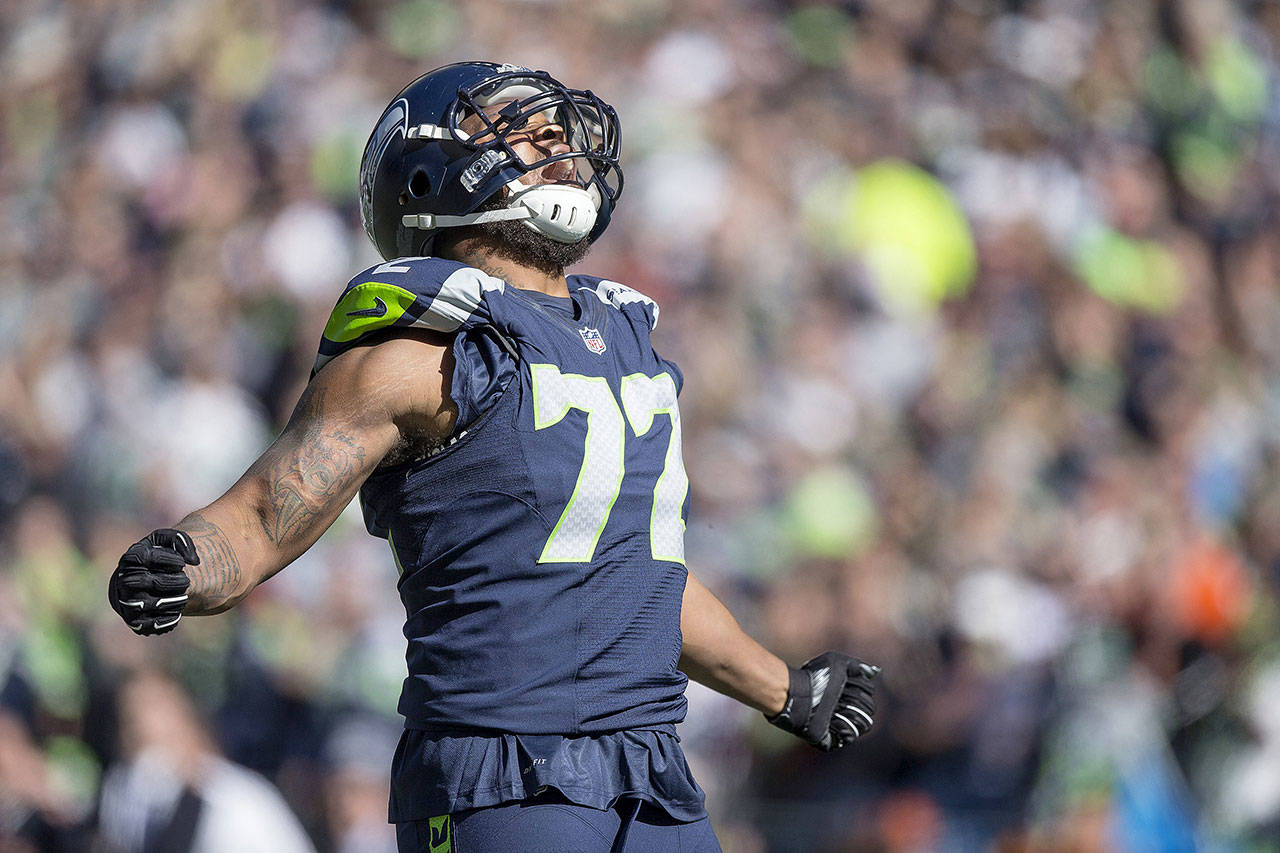By David Haugh
Chicago Tribune
When NFL players Michael Bennett and Marshawn Lynch sit during the national anthem, the only danger comes in becoming desensitized to the protests.
So many fans still fatigued by the Colin Kaepernick controversy want to turn away, disinterested in anything a player does until it affects their fantasy football team or weekend wager. So many people want players to worry only about football the same way they prefer columnists and talk-show hosts stick to sports.
This is the wrong week to make that plea, especially given Bennett’s eloquence in the wake of Charlottesville, Va., experiencing racist violence and President Trump sounding like an apologist for white supremacy.
This is an ideal time to embrace conversations about race that improve our understanding of the athletes we support and the communities they play in — not ignore them. This is not your ordinary NFL season, kicking off three weeks from Thursday, but an extraordinary time for the league and all of sports as it pertains to their role in society.
The most compelling two minutes of NFL exhibition games have become the playing of “The Star-Spangled Banner.” Sports remains a place everyone can turn for escape from their lives, but now, in an era of social instability, we also look their way for direction. Some folks need that just as badly as they process introspection or anger. Take Bennett’s explanation of why he sat for the anthem before the Seahawks exhibition game Sunday, a reminder that these guys can be more than just gladiators.
“Charlottesville was the tipping point for me,” Bennett told CNN in one of several national interviews to raise awareness. “To see so much hate. … There was no way I could go out there and hide behind the game.”
Bennett hopes his actions challenge Americans to feel uncomfortable about race and examine their own feelings, a noble quest. He wants people to understand such protests aren’t disrespecting the flag but a method of bringing attention to what he perceives as systemic racism reinforced by the president of our country making comments applauded by former KKK leader David Duke. To hear Trump refer to members of a group of Nazis spewing hate and carrying weapons as “fine people,” an offensive assertion, only drove the wedge of divisiveness deeper to socially conscious athletes and observers.
The obligation Bennett feels to confront the problem mirrors the responsibility some members of the sports media feel to chronicle it. Spend enough time around games and all their rules and you become conditioned to knowing when a line separating right and wrong has been crossed. In this case, it was easy to see who was offside.
Players like Bennett who are millionaires and guys like fellow anthem protesters Lynch or Eagles safety Malcom Jenkins don’t sound like they’re casting judgment on their own experiences as much as the plight of less fortunate minorities who have no voice.
“Only one side is breeding hate (and) I won’t stand until everyone has justice. I won’t stand until everyone has freedom,” said Bennett, who grew up in a military family in Texas. “There is a point where silence is becoming dishonest. I think people thought the (anthem protest) would go away because (Kaepernick) is out of the NFL. I wish more people would stand up for what they believe in. If silence is what we have to do, I can’t do it anymore. I am living this.”
Even Commissioner Roger Goodell has accepted the reality that social activism likely will become a bigger part of NFL Sundays in light of current events. Goodell doesn’t have to like it — neither do you — but he respects every player’s right to express himself in an appropriate way. We can’t encourage pro athletes to use their platform to promote good social causes only when a majority of media members — predominantly white men — agree with what they say and how they present it.
“It’s one of those things where we have to understand that there are people who have different viewpoints,” Goodell said at a meeting of Cardinals season ticket holders, according to ESPN. “The national anthem is a special moment for me. It’s a point of pride. That is a really important moment, but we also have to understand the other side — that people do have rights, and we want to respect those.”
Now if Goodell could apply pressure to NFL owners — rich, white wealthy men — to end the charade and sign Kaepernick, who’s more qualified to play quarterback than at least half of the backups in the league and some starters. The Dolphins signed Jay Cutler, who had a history with coach Adam Gase, but the rest of the league is running out of excuses. When unqualified quarterbacks like Ryan Mallett (Ravens), Sean Mannion (Rams) and Kellen Clemens (Chargers) occupy spots on NFL depth charts instead of Kaepernick, who had a passer rating of 90.7 in 12 games last year, something smells rotten in Denmark — and Goodell no longer can ignore the stench.
The sad irony: A quarterback who protested oppression of people of color now finds himself oppressed, still looking for a job in a league in which only the players back up their words about equality and opportunity.
Kaepernick might be gone when the NFL season starts next month but, thanks to voices as strong as Bennett’s, he won’t be forgotten.


